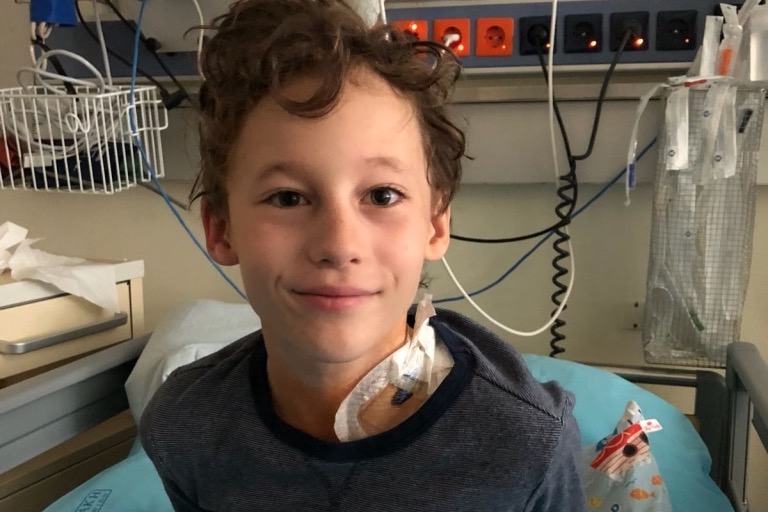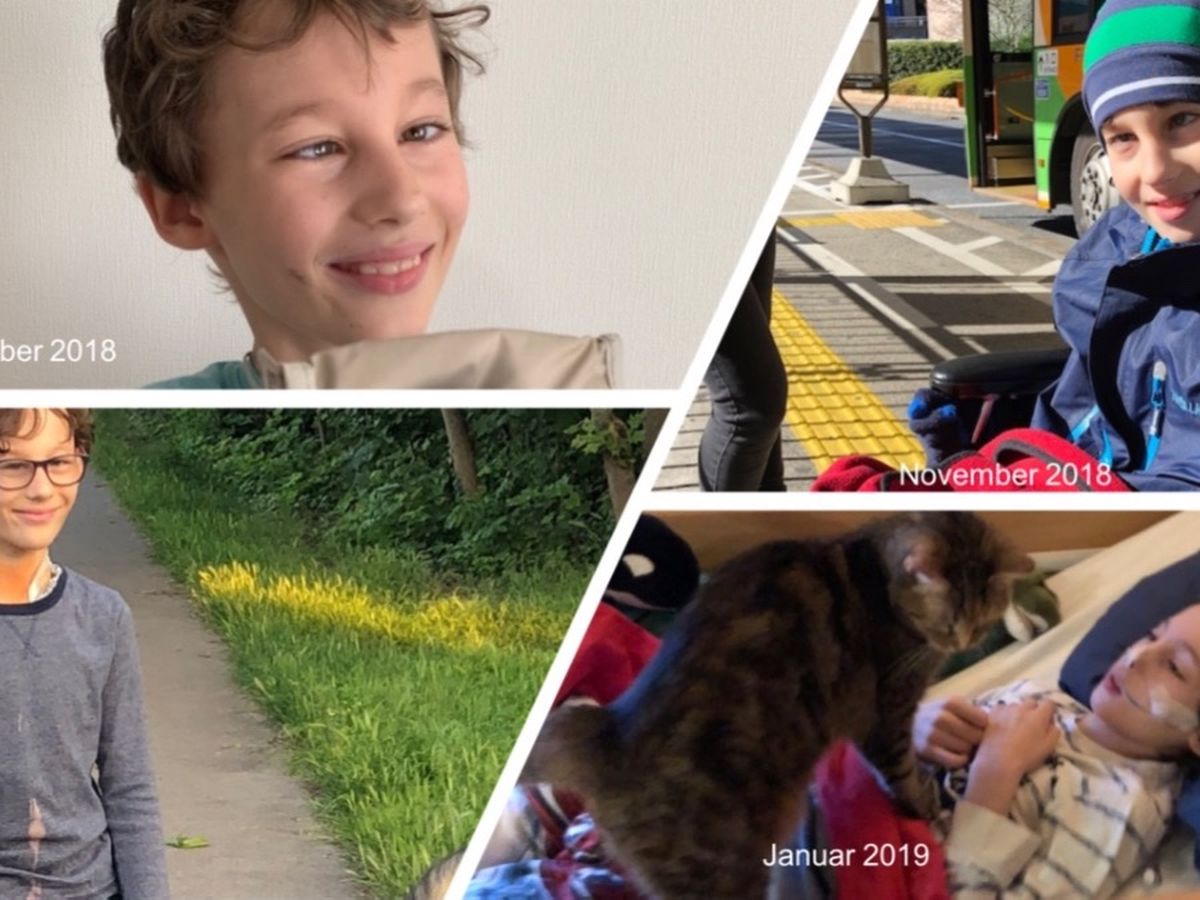
Das ist Lukas, 8 Jahre alt und wohnt in Wien. Er ist mein Neffe, Sohn meiner Schwester Verena und meines Schwagers Stefan und er hat einen tollen, kleinen Bruder Simon.
Vor 3 Wochen wurde bei ihm DIPG 4 (diffuses intrinisches Ponsgliom) diagnostiziert, mit einer weiteren Lebenserwartung ab der Diagnose von durchschnittlich 9 Monaten.
Lukas ist ein quirliger, liebenswerter, lustiger und wissbegieriger Junge, der Tiere liebt und wie seine Mama ein lebensbejahender, hilfsbereiter und lieber Mensch ist.
Nach den ersten Untersuchungen, einer nachgehenden Biopsie und endlosen Stunden im Krankenhaus hat nun letzte Woche die Bestrahlung des Tumors begonnen. Der Anfang eines Kampfes gegen dieses Monstrum DIPG.
Was ist das eigentlich für ein Tumor, der vor allem bei Kinder zwischen 4-11 Jahren, auftritt?! Dieser Tumor DIPG befällt In Nordamerika und Europa zusammen jährlich nur etwa 300 Kinder und die Heilungschancen sind derzeit bei 0. Das 5 Jahresüberleben bei weniger als einem Prozent. Anders als bei vielen anderen pädiatrischen Krebsarten haben sich die Behandlungsergebnisse in den letzten 60 Jahren kaum verbessert.
Der Tumor tritt immer am Hirnstamm auf. Das ist der Teil des Gehirns, der das Kleinhirn mit dem Rückenmark verbindet und für die Basisfunktionen unseres Körpers verantwortlich ist. Das sind die Atmung und das Schlucken, sowie alle Muskeln, die für Sprache und Augen zuständig sind. Daher können diese Art von Tumoren nicht operativ entfernt werden, da die Tumorzellen mit den normalen Zellen des Hirnstammes vermischt sind. Behandlungsoptionen sind daher gering, quasi bei Null.
Die Bestrahlung des Tumors, die bei Lukas nun angewandt wird, ist bis heute leider die einzige Therapie, die nachweisbar den Tumor schrumpfen lässt und die Lebenserwartung der Kinder verlängern kann. Jedoch kann man auch damit den Tumor nicht dauerhaft wegbekommen, da dass Rezidiv (also das, was dann als Tumor wieder nachwächst) extrem aggressiv und schnell ist, d.h. die Patienten können nicht geheilt werden.
Nun würden wir nicht im 21.Jahrhundert leben, wenn es nicht doch einige Forscher geben würde, die sich dieser kaum erforschten Krebsart angenommen hätten. Es gibt vielleicht eine Handvoll von diesen und mit zweien haben Lukas Eltern (Stefan und Verena) Kontakt aufgenommen und vielleicht doch das Wunder geschehen zu lassen, welches Lukas nicht von uns gehen und ihn ganz normal aufwachsen lässt.
Wie oben schon erwähnt ist das Ponsgliom durch seine Vernetzung im Stammhirn nicht zu operieren und daher sind die einzigen 'Standardtherapien' die Strahlentherapie und eine Chemotherapie mit Temozolomid - das ist eine verabreichte natürliche und synthetische Substanz, die das Zellwachstum/Zellteilung hemmt.
Es gibt aber einen neuen Ansatz, die Immuntherapie mit personalisierten 'Impfstoffen' für die T-Zellen, also die Fresszellen des Immunsystems. Die T-Zellen müssen so umprogrammiert werden, dass sie den Tumor nicht mehr als körpereigene Zellen abstempeln und ihn in Ruhe lassen, sondern als körperfremde Zellen erkennen und angreifen.
Verena und ihr Mann Stefan haben Kontakt zu zwei sehr renommierten Forschern auf diesem Gebiet, von denen der eine (Sitz in Japan) jetzt Lukas Gewebeproben analysiert und sequenziert. Bis ins kleinste Detail und schaut, wo man ansetzen kann.
Doch selbst, wenn er ein persönliches Vakzin für Lukas Tumor findet, brauchen sie eine Studie, eine Klinik, die bereit ist, diese „Impfung“ vorzunehmen. Dazu sind ganz spezielle Voraussetzungen der Klinik nötig.
Die Bestimmungen sind da recht streng. Eine klinische Studie für Ponsgliome und Immuntherapie gibt es m.E. zur Zeit nirgends. Alles befindet sich noch im Forschungsstadium. Erste Versuche an Mäusen
waren ganz erfolgsversprechend. Wenn, wie eben beschrieben, das Vakzine passt, müsste Lukas sofort in eine dieser Kliniken (z.B. in Tokio) für diese Immuntherapie, da es sehr strenge Regeln gibt, die besagen, dass ein personalisiertes Vakzin nicht verschickt werden darf.
Neben dieser Behandlung, der Strahlentherapie und der Chemotherapie hat Lukas aller Voraussicht noch knapp ein Jahr. Manche schaffen 5 Monate. Aber Lukas geht es bis jetzt noch den Umständen gut. Er ist reisefähig und noch stark genug, eine mögliche Immuntherapie durch zu stehen. Leider kann sich dieser Zustand jedoch sehr schnell ändern, so dass man dann nur noch palliative Hilfe leisten kann (d.h. Symptome zu lindern oder sonstige nachteilige Folgen zu reduzieren).
Daher ist es aber um so wichtiger, ihm die Zeit so schön wie möglich zu machen und auch vor und zwischen den Behandlungen seine größten Wünsche zu erfüllen - gerne würde er nochmal nach Sankt Peter Ording oder auch nach Italien reisen. Verbunden mit einfach schönen Erlebnissen in der Natur und mit Tieren, die er so liebt.
Um Lukas in den nächsten Monaten rund um die Uhr zur Seite zu stehen, mit ihm all die Behandlungen zu durchlaufen, mit ihm kostbare Zeit zu verbringen und ihm die wichtige Liebe und Kraft zu schenken, ist Lukas Papa Stefan ohne zu Zögern in Pflegekarenz gegangen und Verena hat ihr grade gegründetes Gewerbe still gelegt.
Es ist mir deswegen eine Herzensangelegenheit schnell zu helfen und zu unterstützen, wo man nur kann.
Meine Bitte daher an alle: Da diese oben genannten Punkte so viel Kosten mit sich tragen und tragen werden, vor allem die Kliniken inkl Ärzte, die Behandlungen, die Immuntherapie (wenn sie in Frage kommt) und Lukas Wünsche....denkt an diesen tapferen kleinen Kerl und das vielleicht doch eintretende Wunder, unterstützt und helft bei der Spendenaktion für Lukas und seiner Familie, wenn ihr könnt und teilt den Aufruf / diese Seite.
Danke!
Eure Natascha
+++++++++++++++++++++++++++++++++
Meet Lukas, my nephew. He’s 8 years old and lives in Vienna. He’s the son of my sister Verena and my brother-in-law Stefan, and he has a fantastic little brother named Simon.
Three weeks ago, he was diagnosed with DIPG 4 (diffuse intrinsic pontine glioma), which has a median survival time of 9 months from diagnosis.
Lukas is an adorable, lively, cheerful, and curious little boy who loves animals and, like his Mom, is helpful and charming and has a positive outlook on life.
Now that, after endless hours in the hospital, the initial examinations and a subsequent biopsy have been completed, radiotherapy finally began last week. This is just the beginning of the battle against this monster, DIPG.
What sort of tumor is this, exactly, that mainly picks on children between 4 and 11 years old?! DIPG affects only about 300 children per year in North America and in Europe combined, and the chances of recovery are presently at zero. Less than one percent of patients survive for more than 5 years. Unlike many other pediatric cancers, there has been next to no advances in treatment over the past 60 years.
The tumor always develops in the brain stem. This is the part of the brain that connects the cerebellum at the back of the skull with the spinal cord, which is responsible for some of the body’s most vital functions: breathing and swallowing, and all the muscles responsible for speech and the eyes. This means that this kind of tumor cannot be removed through surgery, as the tumor cells spread out between the healthy brain cells. As a consequence, there are few treatment options – practically none.
Even today, the only treatment known to cause the tumor to shrink and to prolong a child’s potential life expectancy is the radiation that Lukas is receiving now. Yet, given that recrudescence (when the tumor starts to grow back) is extremely aggressive and fast, radiation will not be able to remove the tumor permanently: that is, there is no cure.
But we wouldn’t be living in the 21st century if there weren’t at least some researchers dedicated to investigating this barely studied type of cancer. There is perhaps no more than a handful of these researchers, but Lukas’s parents (Stefan and Verena) have contacted two of them, hoping against hope for a miracle that Lukas won’t be taken from us and that he will go on to grow up like other children his age.
As mentioned above, the pontine glioma cannot be removed through surgery, because it intertwines with the brain stem. Radiotherapy and chemotherapy with temozolomide – a natural and synthetic substance aimed at stopping cell growth/division – are therefore the only “standard treatments.”
But there is a new approach: immunotherapy with personalized “vaccines” for T cells, the scavenger cells of the immune system. T cells have to be reprogrammed in such a way that they stop recognizing and ignoring the tumor as the body’s own cells and begin to recognize it as abnormal cells in need of eradication.
Verena and her husband Stefan are in contact with two leading researchers in this field, one of whom (in Japan) is currently analyzing and sequencing tissue samples taken from Lukas. Examining the smallest of details and looking at where to start.
Yet even if he finds a personal vaccine for Lukas’s tumor, they will need a study, and a clinic prepared to carry out this “vaccination.” The requirements placed on clinics here are quite particular.
The regulations are very strict. To the best of my knowledge, there is no pontine glioma and immunotherapy clinical study in progress anywhere at the moment. Everything is still at the research stage. Initial studies in mice have been quite promising. If, as described above, the vaccine works, Lukas would need immediately to travel to one of these clinics (in Tokyo, for instance) to receive his immunotherapy treatment, as there are very strict rules that disallow the shipment of personalized vaccines.
Apart from this treatment, the radiotherapy, and the chemotherapy, Lukas most likely has about a year left to live. Some children manage five months. But given the circumstances, things are going well for Lukas so far. He can travel and is still strong enough to get through any potential immunotherapy. Unfortunately, his condition can change at any moment, which would mean that the only help we could give him would be palliative care (i.e., alleviating symptoms and reducing any other negative effects).
For this reason, it is all the more important that we help him make the best of his time and, before and between treatments, fulfill his biggest dreams – he would love to visit Sankt Peter-Ording again or to go to Italy. Connected with the simple pleasures of the outdoors and the simple pleasures of being with animals, which he loves so dearly.
While Verena has put her recently established business on hold, Lukas’s father Stefan has not delayed in taking leave from work in order to be constantly by Lukas’s side in the coming months, to support Lukas through all his treatments, to spend valuable time with him, and to give him all the love and strength he needs.
Helping and providing support whenever and wherever possible is a matter very close to my heart.
I am therefore asking each and every one of you: everything I have described above is and will be very expensive, especially the clinics including doctors, treatments, the immunotherapy (if possible), and Lukas’s dreams ... Think of this brave little boy and the potential miracle. Please show your support and help with a donation, if you can, to the fundraiser for Lukas and his family. And please share this appeal/page.
Thank you!
Natascha
Organizer and beneficiary
Verena Vogt
Beneficiary

